Related Research Articles

Antigua and Barbuda is a sovereign island country in the Caribbean. It lies at the conjuncture of the Caribbean Sea and the Atlantic Ocean in the Leeward Islands part of the Lesser Antilles.

The politics of Antigua and Barbuda takes place in a framework of a unitary parliamentary representative democratic monarchy, wherein the sovereign of Antigua and Barbuda is the head of state, appointing a governor-general to act as vice-regal representative in the nation. A prime minister is appointed by the governor-general as the head of government, and of a multi-party system; the prime minister advises the governor-general on the appointment of a Council of Ministers. Executive power is exercised by the government. Legislative power is vested in both the government and the two chambers of the Parliament. The bicameral Parliament consists of the Senate and the House of Representatives.
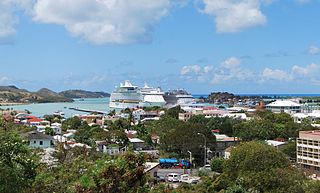
St. John's is the capital and largest city of Antigua and Barbuda, part of the West Indies in the Caribbean Sea. With a population of 22,219, St. John's is the commercial centre of the nation and the chief port of the island of Antigua.
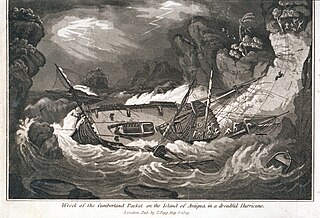
The history of Antigua and Barbuda covers the period from the arrival of the Archaic peoples thousands of years ago to the present day. Prior to European colonization, the lands encompassing present-day Antigua and Barbuda were inhabited by three successive Amerindian societies. The island was claimed by England, who settled the islands in 1632. Under English/British control, the islands witnessed an influx of both Britons and African slaves migrate to the island. In 1981, the islands were granted independence as the modern state of Antigua and Barbuda.
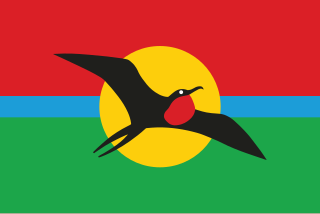
Barbuda is an island and dependency located in the eastern Caribbean forming part of the twin-island state of Antigua and Barbuda as an autonomous entity. Barbuda is located approximately 30 miles (48 km) north of Antigua. The sole settlements on the island are Codrington and its surrounding localities. Barbuda is a flat island with the western portion being dominated by Codrington Lagoon, and the eastern portion being dominated by the low-lying Barbuda Highlands, with salty ponds and scrubland spread throughout the island. The climate is classified as tropical marine.

Sir Vere Cornwall Bird, KNH was the first Prime Minister of Antigua and Barbuda. His son, Lester Bryant Bird, succeeded him as Prime Minister. In 1994, he was declared a "National Hero".
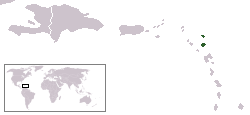
The following is an alphabetical list of topics related to the nation of Antigua and Barbuda.

The Dominican Republic national football team represents the Dominican Republic in men's international football, and is governed by the Dominican Football Federation. The team is a member of the Caribbean Football Union of CONCACAF, the governing body of football in North and Central America and the Caribbean.
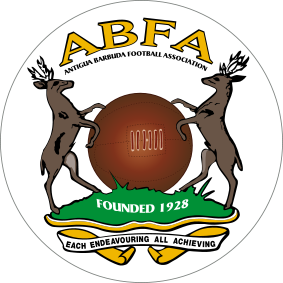
The Antigua and Barbuda national football team is the national team of Antigua and Barbuda.

Antigua, also known as Waladli or Wadadli by the local population, is an island in the Lesser Antilles. It is one of the Leeward Islands in the Caribbean region and the most populous island of the country of Antigua and Barbuda. Antigua and Barbuda became an independent state within the Commonwealth of Nations on 1 November 1981.
The West Indies rugby league team represented the Caribbean and West Indies region in the sport of rugby league football. Governed by the West Indies Rugby League Federation, the team played their only international against South Africa in 2004.
The Jamaica national rugby union team represents Jamaica in the sport of rugby union. The team has thus far not qualified for a Rugby World Cup but has participated in qualifying tournaments.

The Bermuda national rugby union team represents Bermuda in the sport of rugby union. Bermuda are the current Caribbean Champions 2019 although they have thus far not played in a Rugby World Cup, but have participated in qualifying tournaments.

The following outline is provided as an overview of and introduction to Antigua and Barbuda:

Rugby union in the British Virgin Islands is a minor but growing sport. They currently have around 440 registered players.
Rugby union in Jamaica is a minor but growing sport. They are currently ranked 67th by World Rugby, with 2,090 registered players. Rugby union in Jamaica is governed by the Jamaica Rugby Football Union.
The Antigua and Barbuda national rugby union team represents Antigua and Barbuda in the sport of rugby union. They have thus far not qualified for a Rugby World Cup, and have not participated in qualifying tournaments.
The Antigua and Barbuda women's national football team, nicknamed The Benna Girls, is the national women's football team of Antigua and Barbuda and is overseen by the Antigua and Barbuda Football Association, a member of the CONCACAF and the Caribbean Football Union.

Antigua and Barbuda and the United Kingdom of Great Britain and Northern Ireland (UK) are related through a long common history spanning from 1632 for Antigua, and 1678 for the smaller sister-isle of Barbuda through until 1981 for the joint-state. Antigua was one of the oldest English settlements in the West Indies, and served as a British hub of regional administration for the surrounding Leeward Islands.
Royal tours of Antigua and Barbuda by its royal family have been taking place since the 20th century. Elizabeth II, Queen of Antigua and Barbuda, visited the country thrice: 1966, 1977, and 1985.
References
- ↑ Bath, Richard (ed.) The Complete Book of Rugby (Seven Oaks Ltd, 1997 ISBN 1-86200-013-1) p78